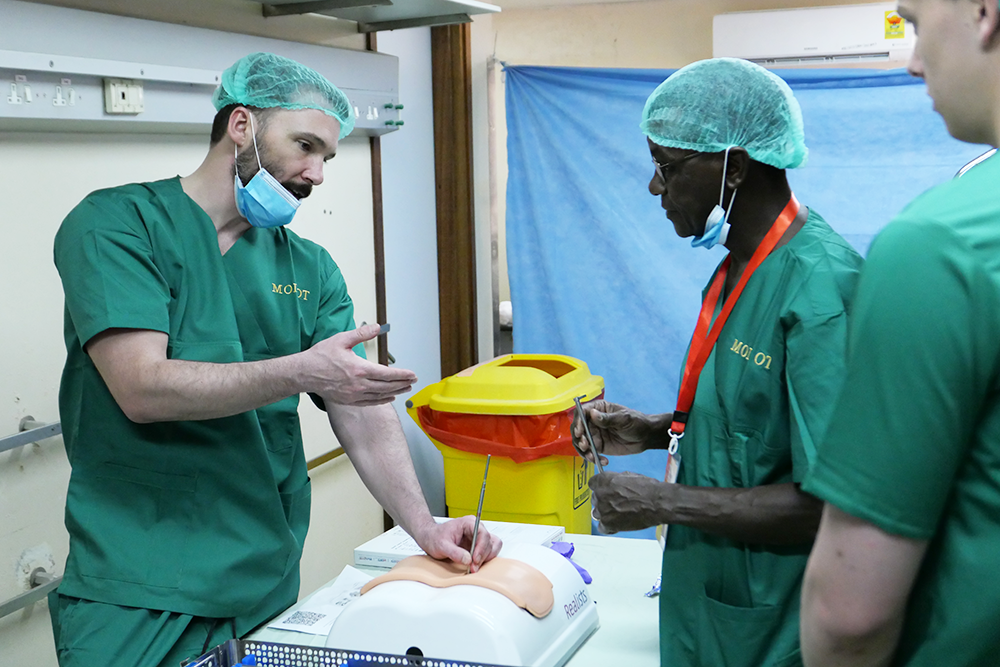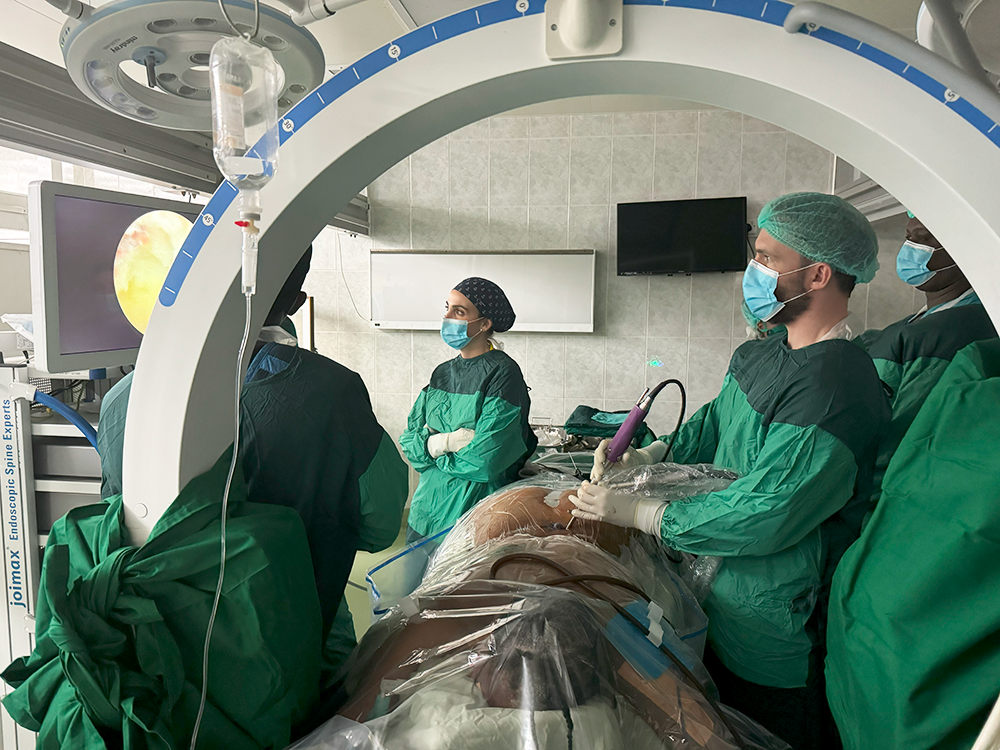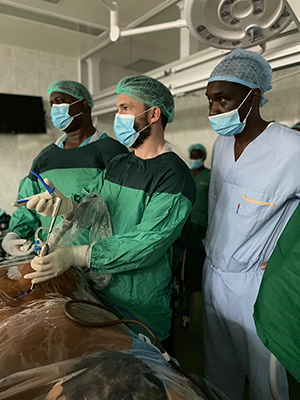Dr. Lynn McGrath is one of the pioneers of endoscopic spine surgery in the United States, committed to bringing this minimally invasive approach to neurosurgery to as many patients as possible. Last month he introduced spinal endoscopy in Tanzania, training local surgeons on the techniques and performing two surgeries – the first-ever endoscopic spine procedures performed in Tanzania, and believed to be the first endoscopic spine procedures performed anywhere in sub-Saharan Africa. As this pilot program develops, spine patients in Africa will be able to have surgery with recovery times, reduced risk of infection or other complications, and faster discharge to home.
This program was conducted in parallel to Dr. Roger Härtl’s Global Neurosurgery Course, which is conducted each year at Muhimbili Orthopaedic Institute in Dar es Salaam, Tanzania. That course has focused on neurotrauma, one of the leading causes of death and disability in the region, and has improved care for thousands of patients over the past 15 years. This year, Dr. Härtl asked Dr. McGrath, Assistant Professor of Neurological Surgery, to develop a pilot program to teach endoscopic spine surgery to a select group of Tanzanian providers, with the goal of expanding services available to the local populations.

After classroom sessions but before moving into the operating room, Dr. Lynn McGrath teaches Tanzanian doctors on an advanced spine surgery simulator.
See a slide show of Dr. McGrath's endoscopic spine surgery in Tanzania here
Endoscopic surgery is relatively new, but it allows surgeons to repair herniated discs, spinal stenosis, and other painful spine conditions with incisions barely an inch long. Patients usually walk out of the hospital the same day and rarely need future surgeries to revisit the endoscopic repair. Patients who undergo endoscopic spine surgery have been shown to have a 93 percent lower risk of infection or hematoma, with faster recovery. These benefits are important to any patient but are especially meaningful in a low-resource environment, where infections and other complications pose tremendous risk.
“We are so grateful to Joimax for the loan of more than a million dollars’ worth of equipment and personnel,” says Dr. McGrath. “The endoscopes and monitors are the foundation of this test program – for this to succeed we need the equipment, medical staff trained to use it, and support staff to maintain it. Joimax generously provided the endoscopes as well as the technicians to train local providers. We are also grateful to Realist, which provided high-tech training models that allowed us to teach the endoscopic techniques on simulators first, before we went into the operating room.”
Dr. McGrath and team spent several days on classroom lectures and case reviews, then began training on the simulation models. The team evaluated patients awaiting surgery, and selected two that were excellent candidates for endoscopy. Both were young and suffering from disabling pain – one from a herniated disc and the other from lumbar stenosis caused by arthritis. Both patients walked out of the hospital after their procedures.
“It’s truly amazing to see,” says Dr. McGrath. “These patients had been virtually crippled from the pain of their conditions, and to see them walking out of the hospitals, back to their families, is extremely gratifying. With the right equipment and trained staff, we can revolutionize how spine surgery is performed in Africa.”
Dr. McGrath is a member of the Endoscopic Spine Research Group (ESRG), a consortium of top endoscopic spine surgeons who are conducting rigorous outcomes studies on endoscopic techniques. The consortium was founded by Dr. Christoph Hofstetter, one of Weill Cornell Medicine’s neurosurgery residency alumni, and includes not only Dr. McGrath but also Dr. Osama Kashlan, who recently joined the Weill Cornell Medicine faculty. The group developed a smartphone app called SPINEHealthie, which allows post-surgical patients to track their recovery and communicate with their surgeon, reducing post-surgical followup visits.
“There are a dozen members of this consortium now,” says Dr. McGrath, “and we hope that our members will visit Tanzania over the coming years to continue the training process. We also have the Global Neurosurgery fellowship program, which places a Western-trained neurosurgeon in Tanzania for a yearlong assignment to ensure we have a permanent presence there. In addition, we bring Tanzanian surgeons to New York to train here, and they return home with advanced skills that they can use to train other local providers.”

Dr. McGrath leads the first endoscopic spine procedure in Tanzania
Dr. Härtl, who is the Hansen-MacDonald Professor of Neurological Surgery and Director of Neurosurgery Spine at Weill Cornell Medicine as well as the founder and director of Och Spine at NewYork-Presbyterian at the Weill Cornell Medicine Center for Comprehensive Spine Care, founded the Tanzania Neurosurgical Project more than 15 years ago to meet a critical need for neurosurgical resources in East Africa. His team trains local surgeons and other healthcare providers during the annual in-person course and provides support throughout the year through ongoing research, consultation, and case review.
“One of the things we discovered early on is that donating equipment alone doesn’t help,” says Dr. Härtl. “Delivering a high-tech microscope might make a big impression when our team arrives for the yearly course, but if there is nobody who knows how to use it, or to fix it when it needs maintenance, its usefulness is limited. That’s why we have concentrated on training over the years, adding equipment only after local staff knows how to operate and maintain it. We are delighted that Joimax is willing to pilot this new project with us, and we look forward to next steps.”
“This year’s pilot course in endoscopy lays the groundwork for a significant future initiative,” adds Dr. McGrath. “With the ongoing support of Joimax and Realist, and the enthusiasm of our partners in Tanzania, I look forward to a remarkably successful program.”
Find out more about how private philanthropy makes our work in Tanzania possible
Photos: Julian Härtl


